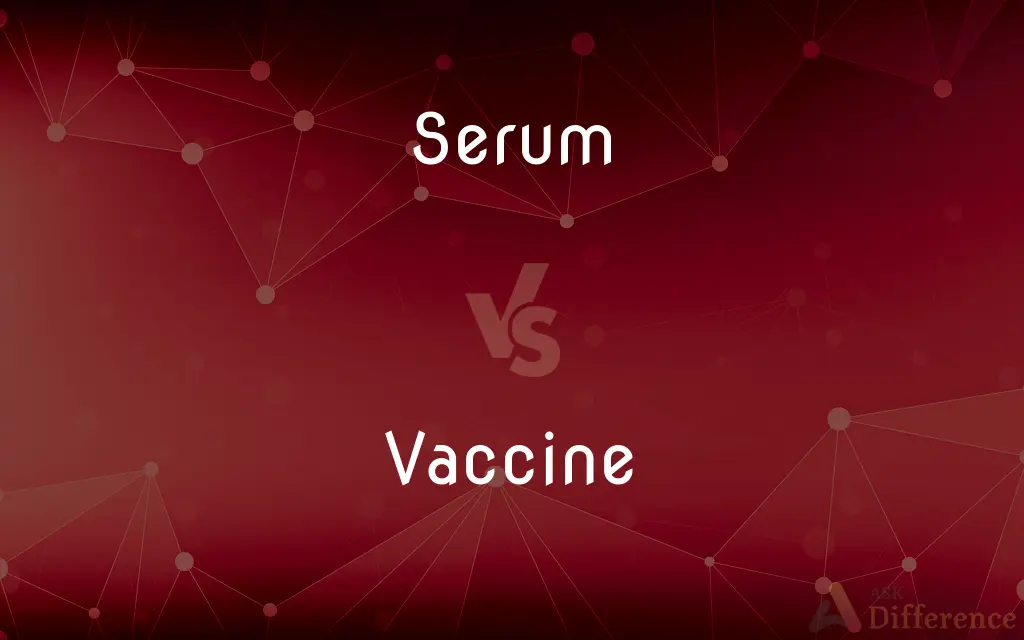Serum vs. Vaccine — What's the Difference?
By Tayyaba Rehman — Updated on September 18, 2023
A serum is a liquid fraction of blood devoid of cells and clotting factors, often containing antibodies. A vaccine is a preparation of weakened or killed pathogens, or their toxins, used to stimulate immunity against disease.

Difference Between Serum and Vaccine
Table of Contents
ADVERTISEMENT
Key Differences
A serum is primarily the clear, yellowish fluid that remains from blood plasma after clotting factors have been removed. This fluid can contain antibodies, which are proteins that the immune system produces to fight off harmful pathogens. On the other hand, a vaccine is a biological preparation that provides active acquired immunity to a particular infectious disease.
The primary use of a serum, specifically when referred to as "antiserum", is to provide immediate passive immunity by introducing antibodies from an immune individual into a non-immune individual. Vaccines, in contrast, work by introducing a component of the pathogen (live, weakened, or inactivated) into the body, stimulating the immune system to recognize and fight off the actual pathogen in future encounters.
Production of a serum involves extracting it from the blood of an individual (human or animal) that has immunity to a certain disease, either because of previous infection or vaccination. Vaccines, conversely, are produced by growing the pathogen (or a part of it) under controlled conditions, then weakening or killing it, or extracting the toxin it produces.
When someone receives a serum, they are obtaining ready-made antibodies, providing immediate, but temporary, protection. With a vaccine, the individual's immune system is activated to produce its own antibodies and memory cells, leading to long-term immunity.
In summary, while both serums and vaccines are tools in the fight against infectious diseases, they function differently. Serums offer quick, short-term protection by introducing external antibodies, while vaccines train the body to defend itself, offering long-lasting protection.
ADVERTISEMENT
Comparison Chart
Definition
Liquid portion of blood minus clotting factors often containing antibodies.
Biological preparation inducing immunity against specific diseases.
Purpose
Provides immediate passive immunity.
Stimulates active acquired immunity.
Duration of Immunity
Short-term, as it introduces external antibodies.
Long-term, as it prompts the body to produce its own antibodies.
Production
Extracted from the blood of immune individuals.
Developed from weakened or inactivated pathogens or their components.
Function
Introduces ready-made antibodies to the body.
Trains the immune system to recognize and combat specific pathogens.
Compare with Definitions
Serum
A liquid containing antibodies used to confer immunity against certain diseases.
The patient received a serum to protect against potential infections.
Vaccine
A biological agent that provides immunity to a specific disease.
Children receive a vaccine to protect against measles, mumps, and rubella.
Serum
A liquid that holds proteins, hormones, and waste products in the blood.
Doctors tested the patient's serum for signs of kidney dysfunction.
Vaccine
An inoculation that triggers the production of antibodies for long-term protection.
The COVID-19 vaccine played a crucial role in combating the pandemic.
Serum
The component of blood that carries water, salts, and enzymes.
Serum levels of certain enzymes can indicate liver health.
Vaccine
A substance derived from pathogens, used to prevent infections.
The vaccine for chickenpox has reduced the number of cases dramatically.
Serum
A product derived from blood that aids in immunity.
The snakebite victim was given a specific serum to neutralize the venom.
Vaccine
A tool in preventive medicine that safeguards against contagious diseases.
Travelers might need a yellow fever vaccine before visiting certain countries.
Serum
The clear, yellowish fluid from blood devoid of cells and clotting components.
After processing the blood sample, the serum was separated for further testing.
Vaccine
A vaccine is a biological preparation that provides active acquired immunity to a particular infectious disease. A vaccine typically contains an agent that resembles a disease-causing microorganism and is often made from weakened or killed forms of the microbe, its toxins, or one of its surface proteins.
Serum
The clear yellowish fluid obtained upon separating whole blood into its solid and liquid components after it has been allowed to clot. Also called blood serum.
Vaccine
A preparation of a weakened or killed pathogen, such as a bacterium or virus, or of a portion of the pathogen's structure, that is administered to prevent or treat infection by the pathogen and that functions by stimulating the production of an immune response.
Serum
Blood serum from the tissues of immunized animals, containing antibodies and used to transfer immunity to another individual.
Vaccine
A preparation from the cowpox virus that protects against smallpox when administered to an individual.
Serum
Watery fluid from animal tissue, such as that found in edema.
Vaccine
(Computers) A software program designed to detect and stop the progress of computer viruses.
Serum
Whey.
Vaccine
(historical)
Serum
The clear yellowish liquid obtained upon separating whole blood into its solid and liquid components after it has been allowed to clot.
Vaccine
(medicine) Of, pertaining to, caused by, or characteristic of cowpox.
Serum
Blood serum from the tissues of immunized animals, containing antibodies and used to transfer immunity to another individual.
Vaccine
(immunology) Of or pertaining to cowpox as a source of material for vaccination against smallpox; also, of or pertaining to such material used for vaccination.
Serum
A watery liquid from animal tissue, especially one that moistens the surface of serous membranes or that is exuded by such membranes when they become inflamed, such as in edema or a blister.
Vaccine
(archaic) Of, pertaining to, or derived from cattle.
Serum
The watery portion of certain animal fluids like blood, milk, etc; whey.
Vaccine
(immunology)
Serum
(skincare) An intensive moisturising product to be applied after cleansing but before a general moisturiser.
Vaccine
A substance given to stimulate a body's production of antibodies and provide immunity against a disease without causing the disease itself in the treatment, prepared from the agent that causes the disease (or a derivative of it; or a related, also effective, but safer disease), or a synthetic substitute; also, a dose of such a substance.
Serum
The watery portion of certain animal fluids, as blood, milk, etc.
Vaccine
The process of vaccination; immunization, inoculation.
My dog has had two vaccines this year.
Serum
Watery fluid of the blood that resembles plasma but contains fibrinogen
Vaccine
(historical) material taken from cowpox pustules used for vaccination against smallpox.
Vaccine
The disease cowpox, especially as a source of material for vaccination against smallpox.
Vaccine
(figuratively)
Vaccine
Something defensive or protective in nature, like a vaccine (sense 1.1).
Vaccine
(computing) A software program which protects computers against, or detects and neutralizes, computer viruses and other types of malware; an antivirus.
Vaccine
Synonym of vaccinate
Vaccine
Of or pertaining to cows; pertaining to, derived from, or caused by, vaccinia; as, vaccine virus; the vaccine disease.
Vaccine
Of or pertaining to a vaccine or vaccination.
Vaccine
The virus of vaccinia used in vaccination.
Vaccine
Any preparation used to render an organism immune to some disease, by inducing or increasing the natural immunity mechanisms. Prior to 1995, such preparations usually contained killed organisms of the type for which immunity was desired, and sometimes used live organisms having attenuated virulence. Since that date, preparations containing only specific antigenic portions of the pathogenic organism have also been used. Some of these are prepared by genetic engineering techniques.
Vaccine
A program designed to protect a computer from software viruses, by detecting and or eliminating them.
Vaccine
Immunogen consisting of a suspension of weakened or dead pathogenic cells injected in order to stimulate the production of antibodies
Vaccine
A preparation used to stimulate the body's immune response against diseases.
The flu vaccine is recommended annually for most individuals.
Common Curiosities
Why might someone receive a serum instead of a vaccine?
In urgent situations where immediate immunity is needed, a serum may be administered, while a vaccine requires time to develop immunity.
Can you receive both a serum and a vaccine for the same disease?
Yes, for some diseases, a serum can provide immediate protection, and a vaccine can ensure longer-lasting immunity.
Can a serum offer permanent immunity?
No, a serum provides temporary protection, whereas a vaccine can offer long-term immunity.
What's the primary difference between a serum and a vaccine?
A serum provides immediate passive immunity with external antibodies, while a vaccine stimulates the body's immune response for long-term protection.
How is a vaccine produced?
A vaccine is produced from weakened, inactivated, or parts of pathogens to induce an immune response.
Can everyone receive serums and vaccines?
While most can, some individuals with specific health conditions or allergies might not be able to receive certain serums or vaccines.
Is serum therapy common today?
While serums are used in specific situations, like snakebites, vaccines and antibiotics are more commonly used for preventive and therapeutic measures.
Do all vaccines provide lifelong immunity?
Not all. Some vaccines provide protection for many years, while others may require boosters.
What's in a serum?
A serum contains the liquid portion of blood, which can include antibodies, proteins, hormones, and waste products.
Why are vaccines important?
Vaccines help prevent outbreaks, reduce the severity of diseases, and protect vulnerable populations.
How soon does immunity develop after receiving a vaccine?
Immunity after a vaccine varies but generally starts to develop within a few weeks.
Are serums and vaccines safe?
Generally, both serums and vaccines are safe, but like all medical treatments, they can have side effects. It's essential to discuss risks and benefits with a healthcare professional.
How do vaccines work?
Vaccines introduce a weakened or inactivated form of a pathogen, prompting the immune system to recognize and fight it in the future.
Do I need a serum if I've already been vaccinated against a disease?
Typically, if you've been vaccinated and have immunity, you won't need a serum. However, certain situations might require it.
Can I travel without getting vaccinated?
Depending on the destination, specific vaccines might be recommended or required to protect against local diseases.
Share Your Discovery

Previous Comparison
Diarise vs. Diarize
Next Comparison
Jacket vs. JerkinAuthor Spotlight
Written by
Tayyaba RehmanTayyaba Rehman is a distinguished writer, currently serving as a primary contributor to askdifference.com. As a researcher in semantics and etymology, Tayyaba's passion for the complexity of languages and their distinctions has found a perfect home on the platform. Tayyaba delves into the intricacies of language, distinguishing between commonly confused words and phrases, thereby providing clarity for readers worldwide.














































